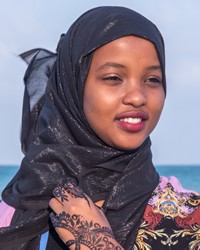Somali in Somalia

Photo Source:
Copyrighted © 2025
MarosMatousek - Shutterstock All rights reserved. Used with permission |
Send Joshua Project a map of this people group.
|
| People Name: | Somali |
| Country: | Somalia |
| 10/40 Window: | Yes |
| Population: | 14,934,000 |
| World Population: | 28,900,200 |
| Primary Language: | Somali |
| Primary Religion: | Islam |
| Christian Adherents: | 0.03 % |
| Evangelicals: | 0.03 % |
| Scripture: | Complete Bible |
| Ministry Resources: | Yes |
| Jesus Film: | Yes |
| Audio Recordings: | Yes |
| People Cluster: | Somali |
| Affinity Bloc: | Horn of Africa Peoples |
| Progress Level: |
|
Introduction / History
The Somali first appeared in the Horn of Africa around 1200 and began expanding westward and southward about 150 years later. They converted to Islam around 1550, under the influence of Arab traders that had settled along the coast of present-day Somalia.
The Somali share a common language, adhere to a single faith, and share a cultural heritage that is an integral part of their nomadic lifestyle. There are four major Somali clan groups. The two largest are the Somaal and the Sab. The Somaal are primarily nomadic shepherds. The Sab usually settle in communities and live as farmers or craftsmen.
Several million Somalis now live scattered across eight countries in the northeastern portion of Africa, commonly called the "Horn of Africa," and in the Middle East, though they have their base in Somalia.
What Are Their Lives Like?
Somali society is based on the nuclear family, consisting of a husband, wife and children. A typical family owns a herd of sheep or goats, which the women and girls care for, and a few burden camels. Some may also own a herd of milking camels. The more camels a man has, the greater his prestige. The men and boys enjoy taking care of the prized camels.
The Somali are warriors. Sometimes the men leave the women in charge of the herds, so they might train to become more effective fighters. They are a very individualistic people, sharply divided by clans. Fights often occur between the clans, resulting in many deaths.
Somali nomads live in portable huts made of wooden branches covered with grass mats. The wife has her own hut, and the huts of related families are arranged in a circle with cattle pens in the middle. Making the home is the woman's responsibility. The huts are easily collapsible so that they can be loaded on pack animals and moved along with the herds. There is usually less than four inches of rainfall a year, so many times a Somali's life is dictated by his ability to find water. The nomad's diet used to consist only of milk and milk products. Now it includes maize meal, rice, meat and wild fruits. The more settled Somali farmers live in permanent, round huts that are six to nine feet high. They have a more varied diet, which includes maize, sorghum, cowpeas, beans, rice, eggs, poultry, bananas, dates, mangoes and tea.
Having an abundant supply of food is a status symbol among the clans. Each family periodically holds banquets for their relatives and friends. A family's prestige is determined by the frequency of its feasts, the number of people invited, and the quality and quantity of food served.
Somali's enjoy telling stories and learning history through their poetry. Many times they will chant folk tales on walks in the evening.
What Are Their Beliefs?
Although Somalis are nearly all Sunni Muslims, numerous beliefs and traditions have been intermingled with their Islamic practices. The standard Islamic prayers are usually observed; however, Somali women have never worn the required veils. Somali frequently turn to the wadaad (a religious expert) for blessings, charms and advice in worldly matters.
What Are Their Needs?
Very few Somali children attend school, and over half of the adults are illiterate. This is not surprising since they did not have a written script until 1972. Droughts, famines, and wars have created numerous problems for the Somali people. They need to achieve a lasting peace before they can form a stable, workable government.
Somali fishermen are plagued by outsiders who dump pollutants in their territorial waters. That also diminishes their much needed food supply.
Prayer Points
Pray for Somali Christians to share the light of the gospel with the Muslims.
Ask God to grant favor and wisdom to mission agencies focusing on Somali people wherever they live.
Pray for effectiveness of the JESUS Film among them.
Ask God to anoint the gospel as it goes forth via radio and television to the Somali.
Ask the Lord to raise up Somali disciples who will make more disciples for the glory of Christ.
Pray for the Lord to give dreams and visions of Christ to Somali Muslim elders.